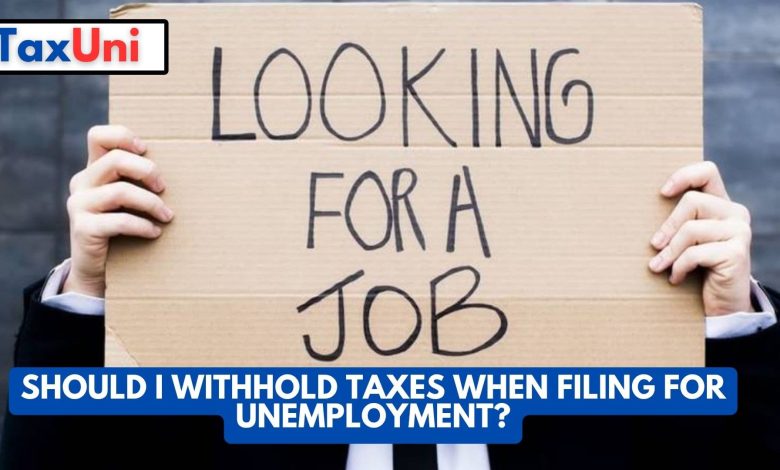
Navigating unemployment can feel like a rollercoaster, and just when you think you’ve got a handle on things, the question pops up: Should I withhold taxes when filing for unemployment? Unemployment benefits are a lifeline, but many people don’t realize these payments are considered taxable income by the IRS. If you’re wondering about tax withholding on unemployment, how it affects your tax return, or what happens if you skip it, you’re not alone. In this article, we’ll break down everything you need to know about tax withholding for unemployment benefits, including how it works, the pros and cons, and how to make the smartest choice for your financial situation. Whether you’re new to unemployment or just want to avoid a surprise tax bill, this guide has your back!
What Does It Mean to Withhold Taxes on Unemployment Benefits?
When you apply for unemployment benefits, you’re often given the option to have federal (and sometimes state) taxes withheld from your payments. This means a portion of each benefit check is automatically set aside to cover your tax liability, just like how taxes are withheld from a regular paycheck. The standard federal withholding rate for unemployment benefits is 10%.
- Federal Taxes: The IRS considers unemployment benefits taxable income.
- State Taxes: Some states also tax unemployment benefits, while others do not.
- Withholding Option: You can choose to have taxes withheld up front or pay them later when you file your tax return.

Pros of Withholding Taxes from Unemployment
- No Surprise Tax Bill: Withholding helps you avoid a big tax payment when you file your return.
- Simplifies Tax Filing: Less paperwork and fewer calculations at tax time.
- Peace of Mind: You won’t have to worry about saving money for taxes throughout the year.
- Avoids Penalties: Proper withholding can help prevent underpayment penalties.
Cons of Withholding Taxes from Unemployment
- Smaller Weekly Payments: Your benefit checks will be lower each week.
- Immediate Cash Flow: If you need every dollar now, withholding reduces what you take home.
- Over-withholding: If your total income is low, you might end up getting a refund anyway.
What Happens If You Don’t Withhold Taxes?
If you choose not to withhold taxes from your unemployment benefits, you’ll receive the full amount each week. However, you’ll still owe taxes on that income when you file your tax return. This could mean:
- Owing a lump sum to the IRS (and possibly your state) at tax time.
- Potential underpayment penalties if you haven’t paid enough throughout the year.
- The need to set aside money from each payment to cover your future tax bill.

How Do You Set Up Tax Withholding for Unemployment?
- During Application: Most states let you select tax withholding when you first apply for benefits.
- After Approval: You can usually update your withholding choice through your state’s unemployment portal.
- IRS Form W-4V: To request federal withholding, you can submit IRS Form W-4V (Voluntary Withholding Request) to your state’s unemployment office.
Should You Withhold Taxes? Key Factors to Consider
- Your Overall Income: If unemployment is your only income, your tax bill may be lower.
- Other Household Income: Combined income from a spouse or side jobs can push you into a higher tax bracket.
- State Tax Rules: Check if your state taxes unemployment benefits.
- Financial Cushion: Can you afford to have less money now to avoid a surprise later?
Tips for Managing Taxes on Unemployment
- Estimate Your Tax Liability: Use a tax calculator to see how much you might owe.
- Set Money Aside: If you don’t withhold, try to save a portion of each check for taxes.
- Consult a Tax Pro: If you’re unsure, a tax advisor can help you make the best decision.
- Stay Organized: Keep records of all your unemployment payments for tax time.

State-by-State Taxation of Unemployment Benefits
Below is a complete table listing all 50 U.S. states and the District of Columbia, indicating whether each state taxes unemployment benefits or not.
| State | Taxes Unemployment Benefits |
|---|---|
| Alabama | No |
| Alaska | No (no state income tax) |
| Arizona | Yes |
| Arkansas | Yes |
| California | No |
| Colorado | Yes |
| Connecticut | Yes |
| Delaware | Yes |
| Florida | No (no state income tax) |
| Georgia | Yes |
| Hawaii | Yes |
| Idaho | Yes |
| Illinois | Yes |
| Indiana | Yes |
| Iowa | Yes |
| Kansas | Yes |
| Kentucky | Yes |
| Louisiana | Yes |
| Maine | Yes |
| Maryland | Yes |
| Massachusetts | Yes |
| Michigan | Yes |
| Minnesota | Yes |
| Mississippi | Yes |
| Missouri | Yes |
| Montana | No |
| Nebraska | Yes |
| Nevada | No (no state income tax) |
| New Hampshire | No (no state income tax) |
| New Jersey | No |
| New Mexico | Yes |
| New York | Yes |
| North Carolina | Yes |
| North Dakota | Yes |
| Ohio | Yes |
| Oklahoma | Yes |
| Oregon | No |
| Pennsylvania | No |
| Rhode Island | Yes |
| South Carolina | Yes |
| South Dakota | No (no state income tax) |
| Tennessee | No (no state income tax) |
| Texas | No (no state income tax) |
| Utah | Yes |
| Vermont | Yes |
| Virginia | No |
| Washington | No (no state income tax) |
| West Virginia | Yes |
| Wisconsin | Yes |
| Wyoming | No (no state income tax) |
| District of Columbia | No |
Note:
- States with “No (no state income tax)” do not tax unemployment benefits because they do not have a state income tax at all.
- This information reflects the most current data as of 2025. Always check your state’s latest tax laws for any updates or changes.
FAQs
Q: Is unemployment income always taxable?
A: Unemployment benefits are taxable at the federal level, and in some states, they’re taxed at the state level too.
Q: What’s the standard federal withholding rate for unemployment?
A: The standard rate is 10% for federal taxes.
Q: Can I change my withholding choice later?
A: Yes, most states allow you to update your withholding preference at any time through their unemployment portal.
Q: What happens if I don’t withhold taxes from my unemployment?
A: You’ll need to pay the taxes owed when you file your tax return, which could result in a large bill or even penalties if you haven’t set money aside.